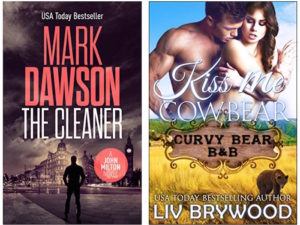There is in the publishing industry a definite bias towards women. Jason Pinter’s excellent article in the 25 May 2011 HuffPost, “Why Men Don’t Read: How Publishing is Alienating Half the Population”, explains the reason for and critiques this bias. I think he is right on target.
What’s worse is when publishers grudgingly admit that maybe men do read, but then immediately add — they don’t read fiction!
I think that’s about as true as the fact horses have feathers.
Men do read fiction. I won’t believe anyone who tries to tell me men don’t read Clive Cussler, or Lee Child, or Tom Clancy, or William W Johnstone. Or when they were boys didn’t read Sherlock Holmes, or Tarzan, or Doc Savage. I just won’t believe it.
Porter Anderson, in a 26 December 2013 post on Jane Friedman’s blog, “Men Don’t Read Fiction? BULL! — Writing on the Ether”, explodes the publishing myth that men don’t read fiction. Do take a read. It’s an excellent post.
I think part of the problem is the ever increasing focus on women in our society, as a way to right their previous inequality. We’ve seen an explosion of genres and categories that target women. Starting with the very explicit Women’s Fiction.
There’s nothing wrong with marketing books to a particular demographic. Nothing. In fact, it’s good business. But if it’s good business to market to women, why isn’t it also good business to market to men?
I’m a man, and I read. I even read fiction. In fact, I mostly read fiction. I certainly can’t be the only guy who does. And I know for a fact, I’m not.
In an exceedingly insightful paper written by Kate Summers and published in the Spring 2013 (Vo. 52, No. 3) issue of RUSA, Ms. Summers provides us with information that supports what we already know but fail to act on: men and women are different — and have very different reading interests and habits.
For example, Summers points out that the culprit in fostering this bias against the male reader may in fact be the public school system.
She notes:
“boys’ under achievement in reading is a result of a school curriculum that is ‘biased towards girls’ reading interests’ or a product of the predominance of female teachers versus male teachers, which contributes to boys’ perception of reading as being a feminine pursuit.”
Young boys, who certainly don’t want girl germs, aren’t going to be interested in fiction geared towards girls. Why? Because boys have very different interests vis-a-vis girls. And if we try to force boys to read what they don’t want to read, they are just going to tune us out and play with their X-Box.
Summers cites a classroom study of 6 boys, which just so happens to coincide with my own experience: namely, that boys will read fiction that ties in with their interests.
Early on, I was fascinated with dinosaurs. Consequently, I liked stories that featured dinosaurs; such as, Danny and the Dinosaur and The Shy Stegosaurus of Cricket Creek. As my interests developed, so did my interest in fiction on those topics.
If you want boys to read fiction, find out what they’re interested in and give them fiction to read on those subjects.
Girls will read Betsy, Tacy, and Tib; and the boys will read Star Rangers. And all will be well with the world.
So if we were to have a new BISAC fiction code for Men’s Fiction (one doesn’t exist now, while women have FIC044000 FICTION/Women) what would be the characteristics of this category, or genre? What would make it different from Women’s Fiction?
Based on the information cited in Ms. Summer’s article, I put forward the following as a starting point.
Men’s Fiction would in general
-
-
- Be written by men (perhaps women using a male pen name)
- Have a male protagonist
- Contain elements of the genres preferred by men, such as adventure, humor, horror, and science fiction
- Have believable characters with whom they can identify
- Be realistic fiction that deals with contemporary problems of people
-
Which means if male authors want to attract male readers they need to re-think their reliance on the kick-ass heroine as the protagonist. While the kick-ass heroine may attract some male readers, as a whole men don’t like female main characters. This is because men have a greater need to identify with the protagonist than do women. Something to think about.
Erle Stanley Gardner noted that one of the reasons for the popularity of Sherlock Holmes was due to “the extreme masculine atmosphere and the yearning for freedom.”
After a time, even the most happily married man begins to feel squeezed by his responsibilities to his family. He may be tied to a job he doesn’t like. He may have doctor bills. Chores like cutting the grass, or painting the house. There are dirty diapers, lack of sleep, and the Terrible Twos.
Holmes and Watson were blissfully free from all those things. Their extremely masculine world is something every guy dreams of — no matter how much he may love his wife and kids.
Gardner also wrote:
Every story, or rather, every type of story that has succeeded has the common point of a single man, unaided, overcoming difficulties by the inherent power that is within him and attached to him.
I’m not sure this applies to women’s fiction, but it sure as heck applies to men’s fiction. That is every man’s dream: To conquer the impossible without any help or aid. It is the essence of the adventure story, a genre much preferred by men — not women.
Michael-Scott Earle is building an audience by marketing to men. And I’d guess young men in particular.
That his approach is working can be seen in the fact that in 2 Kickstarter campaigns he conducted this year, he pulled in over $228,000 in pledges. Men do read fiction folks.
Earle’s books hit on all the main features of Men’s Fiction:
-
-
- They have a male protagonist
- They have a main character with whom men can identify.
- They have plenty of action and adventure
- They contain humor preferred by men
- They are in the fantasy and science fiction genres
- They deal with contemporary issues
-
What I was delighted to see in Earle’s writing is how the male hero gains self-confidence with the help of strong and intelligent women. The women want “their man” to be strong and confident and reward that strength and confidence by becoming his companions and sexual partners.
Male confidence, particularly white male confidence, has taken a beating at the hands of extreme feminism. I’m glad to see Earle giving men back that confidence through his fiction.
Earle has shown us that books marketed to men will sell. Maybe it’s time we start to cater to the needs of the male reader.
There is #MensFiction on Twitter. Maybe we should start using that hashtag.
Men do read fiction. They aren’t as social about their reading as women, which may account for all those surveys which say men don’t read. But they do read and they do tell other men about the books they’ve read.
With the advent of ereaders, there is a new privacy when reading in public. No longer can the world see your book cover. This may work to the advantage of men. They can read their guilty pleasures, Conan the Barbarian, Doc Savage, and Longarm, and not get questioning looks. Something to think about.
Comments are always welcome! And until next time, happy reading!
 CW Hawes is a playwright, award-winning poet, and a fictioneer, with a bestselling novel. He’s also an armchair philosopher, political theorist, social commentator, and traveler. He loves a good cup of tea and agrees that everything’s better with pizza.
CW Hawes is a playwright, award-winning poet, and a fictioneer, with a bestselling novel. He’s also an armchair philosopher, political theorist, social commentator, and traveler. He loves a good cup of tea and agrees that everything’s better with pizza.
If you enjoyed this post, please consider buying me a cup of tea. Thanks! PayPal.me/CWHawes
Share This!
